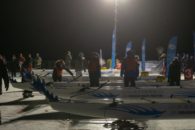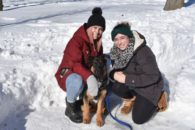For Paul Perry, working as a volunteer with motorcycle clubs and search and rescue groups gives him a reason to stay in shape and provides stimulus for his brain. After 32 years in the Canadian Armed Forces, working for NATO in Brussels and in Afghanistan before retiring in Ottawa, he’s looking for the regimentation he got from the military.
“I started a ride for one of the organizations in the city that caters to young mothers,” says Perry. “I called it the ‘Diaper Ride.’” For a ride on the motorcycle, you need only donate a box or carton of diapers, and the motorcyclists will make sure the mothers get them.
Perry also spends about 10 hours a week working with SBO-OVSAR (Sauvetage Bénévole Outaouais – Ottawa Volunteer Search and Rescue), where he feels his military-acquired skills are especially useful.
“Map reading and this sort of thing I can utilize within this organization,” he says.
Search and rescue isn’t all about finding people though. It’s often about strategizing to find solutions to problems and helping citizens after disasters; this includes clearing houses if a family needs to move and fixing yards so children can play in them again, according to Perry. Most of the work he does is in the Dunrobin area, which experiences a large amount of flooding each year.
“I would go up to the home,” Perry says, “talk to the homeowner and see exactly what they needed. In most cases it was stuff like sandbags. So I would estimate how many sandbags and transport them back with a bunch of volunteers. We would be able to barricade around their house. That went on for weeks.”
Perry especially enjoys training canines for search and rescue. He works as a “hider.”
“I’ll go 200 or 300 metres in the bush and shelter, and then hide there for a couple of hours waiting for the dogs to come and find me,” Perry says. “You get to lie inside your sleeping bag and drink tea. But then the dogs find you, and there’s a certain way the dogs have to be rewarded. Usually it’s with a toy. Once they find you, you’re taken back.”
While that may be all fun and games, search and rescue can be taxing on emotions. Search and rescue teams can strategize how to look for a person based on specific profiles.
“If an individual has Alzheimer’s, they tend to walk in a straight line, and they’ll just keep walking in a straight line until they come to an obstacle,” Perry says. “People that are autistic will tend to walk to 300 metres away and then hide.”
According to Perry, “every time I go on one of these searches, there are one of three outcomes. You find the individual, and everybody’s happy. You find the individual and they’re deceased, which brings closure. Or they’re never found… those are the really frustrating ones.”
Perry recounts one particularly harrowing case. “We found a gentleman who unfortunately took his own life, probably within a couple of hours of us finding him,” he says. “But you know, when you do find someone and they’re alive, obviously that provides a great sense of satisfaction.”


